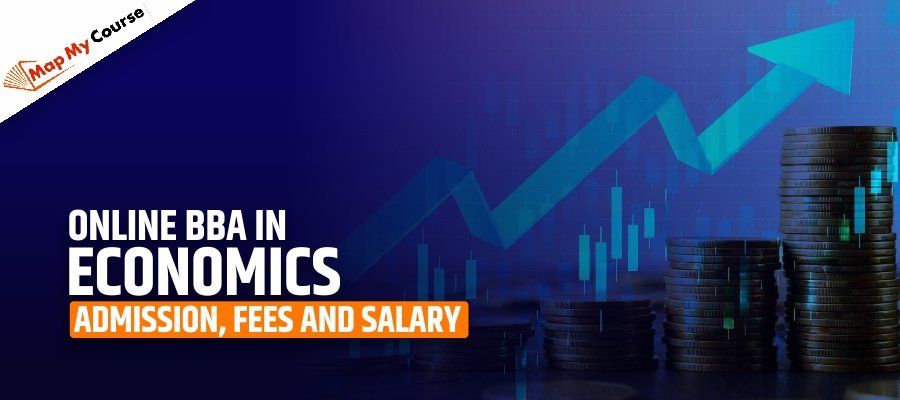Online BBA in Economics brings the advantage of the convenient study and provides a strong foundation in economic theory, business, and analysis. Designed to suit working adults and students who require a flexible schedule to attend classes, this program offers courses in microeconomics, macroeconomics, finance, and international business. The curriculum emphasizes the acquisition of critical thinking, problem-solving skills, and decision-making skills to enable the graduates to work in the fields of finance, consultancies, Government, and various business fields. The flexibility of online delivery guarantees effective and entertaining classes, thus being open to consumers globally.
What is a BBA in Economics?
A Bachelor of Business Administration (BBA) in Economics is an undergraduate degree that combines business management with economic concepts. This program offers students a broad understanding of business management and tools for economic analysis. Microeconomic theory and practice, macroeconomic theory and practice, financial markets, international economics, and competitive strategy. The BBA in Economics develops students’ problem-solving and quantitative analysis abilities for various opportunities in the financial and business departments. Graduates are equipped with skills in analyzing and solving economic and business problems; thus, graduates are valuable assets in their respective fields.
Advantages of Pursuing Online BBA in Economics
- BBA in Economics offers flexibility to the students with jobs or other commitments because they can attend class, view contents, access notes, or complete assignments at their own convenience without worrying about other responsibilities.
- Online BBA in Economics increases the accessibility of higher education to more people, especially those who cannot afford to move or travel to a University. Students can attain their academic dreams without necessarily having physical access to campus.
- Online BBA programs in Economics is structured to provide the learners with the flexibility of fully self-scheduled learning.
- Pursuing an online BBA in Economics is cheaper than traditional on-campus programs. Expenses like transport, accommodation, and other campus-related fees are some of the areas in which a student can be relieved.
- Access to course materials is quite affordable for those attending online programs since many programs use digitized texts and other resources to help contain costs.
- Students in an online BBA in Economics program develop a range of valuable skills. Analytical and critical thinking skills are honed through the study of economic models and data analysis. Problem-solving abilities are enhanced as students learn to tackle complex economic issues
- BBA in Economics has provided great employment opportunities to those who have completed their graduation. They can look for employment in the financial sector, banking, consulting houses, government jobs, and the corporate sector.
Career Options after BBA in Economics
Financial Analyst
Financial analysts play an important role in assisting institutions and individuals in making proper investment decisions. They process numerical information, research consumer behavior, and prepare predictions for investment decisions. These professionals are employed by banks, investment firms, insurance companies, and companies’ financial departments. Their specialized knowledge of economics and specific financial markets is invaluable in these positions.
Economic Consultant
Economic consultants are professionals who offer advice on different economic issues affecting firms, governments, or non-profit institutions. They engage in research, data analysis, and modeling to find solutions to economic challenges or economic forecasts. This position usually entails serving in tasks associated with market research, policy assessment, and economic effect reviews. A BBA in Economics facilitates the development of strong analytical and quantitative abilities that are crucial to the field.
Business Analyst
Business analysts play a critical role in improving business processes and systems. They collect and process information to define a business requirement, make recommendations on a course of action, and facilitate the process of implementing these changes. Because they have an understanding of both economics and business, they are able to close the gap between what the business wants to achieve and what technology can offer. Business analysts work in different industries, such as the technological sector, health care, finance, and retail.
Policy Analyst
Policy analysts can be employed in various sectors, most commonly in government departments and ministries, research institutes, and non-governmental organizations. They study and assess how policies affect economic aspects of life, including taxes, health care, education, and employment. Their aim is to evaluate the effects that policies may bring about and offer some suggestions to the policymakers. A BBA in Economics will equip one with the analytical and research skills required for performing this task.
Management Consultant
Management consultants work with companies to increase the efficiency of their operations while identifying and addressing existing issues. Most of the time, they deal with change management, strategic planning, and process improvement initiatives. The general business learning and strategic management abilities gained in a BBA in Economics program are very useful in this area.
Market Research Analyst
Market research analysts identify market conditions that could possibly lead to the volume of sales of a certain product or service. They collect information on consumers, competitors, and markets and assist organizations in determining the demand for the product, the customer for the product, and the price that they should set for the product. This role entails problem-solving and data analysis skills, which are taught in an economics course.
Financial Planner
Financial planners help people and companies avoid poor financial decisions and aid them in achieving their financial objectives. They give information concerning investment, insurance, retirement, and estate. The knowledge of economic principles and financial markets that one acquires upon completion of a BBA in Economics is vital to offering sound financial planning advice.
Banker
Bankers hold different positions in retail, commercial, and investment banking industries. They may be engaged in customer account management, extending credit, or providing investment services. Their role often entails evaluating economic circumstances and their implications for products and services in the financial sector. The knowledge of economics and business acquired from a BBA program is essential for the banking field.
Entrepreneur
A BBA in Economics also provides an excellent foundation for aspiring entrepreneurs. The course covers areas that are basic to the running of any business including; accounting, marketing, and management skills in the context of entrepreneurship. This shows that the entrepreneurs employ their economic knowledge in organizing the business and making sound economic decisions.
Sales Manager
Sales managers are responsible for managing a firm’s sales force and for designing sales force plans. They study the sales figures, comprehend the market conditions, and determine strategies that will enhance sales. This role highly benefits from the economics understanding and business practicality from a BBA in Economics.
Syllabus of BBA in Economics
Here is the common Syllabus for BBA in Economics in different universities:
Semester-I | Semester-II |
· Principles of Management · Business Economics · Management Accounting · Operation Management · Micro Economics | · Business Ethics · Behavioural Finance · Organizational Behaviour · Communication Skills · Statistics for Business Decisions |
Semester-III | Semester-IV |
· Marketing Management · Entrepreneurship · Macro Economics · Operational Management · Environmental Science | · Computer Applications · Indian Economy · Business Statistics · Fundamentals of Econometrics · Electives |
Semester-V | Semester-VI |
· World’s Economics · Financial Econometrics · Financial Derivatives · Research Methods · Summer Project | · Managerial Economics · Entrepreneurship Development · Small Business Management · Research project · Internships |
What you get to learn in this specialization
- Business Economics is an essential component of the BBA in Economics specialization, which deals with the application of economic theories and statistics to study business organizations and aspects that lead to business diversification.
- It can be defined as the link between micro and macroeconomic theories and real-life business concerns like markets and prices, risks, and decisions.
- Business economics is the application of microeconomic and macroeconomic theories and concepts to provide students with the tools of analysis to solve business problems, allocate resources efficiently and effectively, and improve strategic business planning, thus making them beneficial resources in different business settings.
- Microeconomics is a basic course in BBA with a specialization in Economics.
- It concentrates on the decision-making process of people and companies concerning the rationing of scarce resources.
- The subject focuses on the ways these entities operate in markets to set prices of commodities and services, distribute resources, and distribute income.
- Some of the key concepts include supply and demand, elasticity, consumer behavior, production and cost, and market structures.
- Statistics for Business Decisions is one of the core subjects offered in the BBA in Economics program since it enables students to make sound business decisions.
- This course is about statistical techniques and their practical implementation in business environments.
- Through these techniques, the learners are in a position to analyze data and make correct decisions which enhance business performance.
- This subject is a stepping stone for strategic thinking and problem-solving, skills that would prove useful for business executives and economists in the future.
- Behavioural Finance, as a course under BBA in Economics, focuses on the psychological factors that affect decisions made by investors and other financial professionals.
- This field intertwines aspects of psychology and economics to analyze market inefficiencies, investor behavior, and decision-making processes.
- Enables students to make better decisions in the financial markets and, therefore, improve the overall efficiency of the markets.
- Behavioural Finance, as a course under BBA in Economics, focuses on the psychological factors that affect decisions made by investors and other financial professionals.
- This field intertwines aspects of psychology and economics to analyze market inefficiencies, investor behavior, and decision-making processes.
- Enables students to make better decisions in the financial markets and, therefore, improve the overall efficiency of the markets.
Entrepreneurship
- Entrepreneurship as a concentration in BBA in Economics blends economics and entrepreneurship, enabling students to recognize opportunities and exploit them.
- This subject examines the formation and growth of new businesses and the application of economic factors affecting business ecosystems.
- This is the place where students get acquainted with such subjects as market analysis, resource management, financial planning, and decision-making.
- The subjects promote the creative mindset and problem-solving skills while providing future businessmen and women with the knowledge to help build the economy and successful businesses.
- This combination of economics and entrepreneurship equips learners for divergent job markets and fosters economic growth and creativity.
Macroeconomics
- Macroeconomics is one of the foundational courses in BBA Economics It analyses factors such as Gross Domestic Product, rate of unemployment, inflation levels, and effects of government policies on economic growth.
- They explore concepts such as aggregate demand and supply, fiscal and monetary policies, international trade, and economic development.
- It is essential when developing business strategies, predicting economic trends, and recognizing the relationships between markets in the current global marketplace.
- The course empowers BBA Economics students with analytical tools that enable them to evaluate and shape economic policies and their impact on enterprises and society.
Financial Econometrics
- Financial Econometrics is an area of focus in the BBA combines economic theory with mathematical analysis to analyze and predict markets, securities, and statistics.
- Some of the subjects covered by students include time series analysis, regression analysis, volatility modeling, and risk management. T
- his subject provides learners with basic quantitative competencies for analyzing and assessing financial information and for testing theories and hypotheses in finance and investing.
- It equips them for jobs in financial analysis, portfolio management, risk evaluation, and economic advisory services.
Managerial Economics
- Managerial Economics is an essential course in the BBA specialization of Economics since it considers economic theory and quantitative tools for decision-makers.
- firms and managers apply economic theories to addressing real-life issues involving production, pricing, distribution, and policymaking is also examined.
- As a subject of study, Managerial Economics enables students to understand strategic management, competition analysis, and market prediction.
- It empowers them with practical skills to make proper choices that lead to improvement of organizational performance and profitability across different sectors.
Top Universities offering BBA in Economics
| S.no. | Universities |
| 1. | University of Delhi (DU) |
| 2 | Christ University, Bangalore |
| 3 | NMIMS University, Mumbai |
| 4 | Symbiosis International University, Pune |
| 5 | Amity University, Noida |
| 6 | Loyola College, Chennai |
| 7 | Mount Carmel College, Bangalore |
| 8 | Xavier Institute of Management and Entrepreneurship (XIME), Bangalore |
| 9 | Madras Christian College (MCC), Chennai |
| 10 | ICFAI Business School (IBS), Hyderabad |
Eligibility Criteria for BBA in Economics
- Candidates must have a 10+2 pass in any recognized board like CBSE/ICSE/state boards, etc.
- It is normally expected that the candidate should score a minimum of 50-60% aggregate score.
- Several universities might conduct a specific range of tests that the candidates have to undertake prior to their admission into the universities in question. Commonly accepted exams include:
- Undergraduate Common Entrance Test (UGCET)
- Joint Entrance Examination (JEE)
- Institution-Specific Exams
- Generally, candidates should ordinarily be below the age of 18-23 years at the time of admission. However, this may differ from one institution to the other.
Admission Process for Online BBA in Economics
- It is necessary to fill in the application form, which is posted on the website of the selected University. This usually include identification information, academic information, and the communication details.
- Applicants have to Upload the scanned copies of required documents, which typically include:
- High school transcripts or mark sheets
- Proof of age (birth certificate or government-issued ID)
- Passport-sized photograph
- Any other documents specified by the university
- Pay the non-refundable application fee as specified by the institution.
- Prepare for and appear for the Entrance exams as per the schedule provided by the institution.
- The institution notifies applicants of their admission status After reviewing applications and conducting interviews. Accepted students receive an admission offer letter outlining further steps, such as fee payment and Enrollment procedures.
- Upon acceptance, students typically need to confirm their Enrollment by paying the tuition fees and completing any additional paperwork required by the institution.
other specialisation of BBA
Data Science | ||
Healthcare Management |
Books Suggested for BBA in Economics
- “Principles of Economics”by N. Gregory Mankiw
- “Economics: The User’s Guide”by Ha-Joon Chang
- “Freakonomics: A Rogue Economist Explores the Hidden Side of Everything”by Steven D. Levitt and Stephen J. Dubner
- “The Wealth of Nations”by Adam Smith
- “Macroeconomics”by Paul Krugman and Robin Wells
- “Thinking, Fast and Slow”by Daniel Kahneman
- “Capital in the Twenty-First Century”by Thomas Piketty
- “The Theory of the Leisure Class”by Thorstein Veblen
- “Nudge: Improving Decisions About Health, Wealth, and Happiness”by Richard H. Thaler and Cass R. Sunstein
- “The General Theory of Employment, Interest, and Money”by John Maynard Keynes


















